- Home
- Harlan Ellison
Spider Kiss Page 14
Spider Kiss Read online
Page 14
“We’re going to call it STAG!”
It fit.
FOURTEEN
Porter Hackett waited only long enough to have half a dozen prints made of the film and an equal number of tape recordings cut off the master, to be synchronized with the film. He did not have long to wait, for in the rumpus room of the huge Moorish-style mansion there was a completely outfitted darkroom. A fully outlined processing set-up. A fully developed facility for producing dozens and dozens of “art films” to be sold and distributed throughout the country.
For smokers. For stag dinners. For office parties. For private collectors. For fraternity rush parties.
For blackmail.
When Porter and his two-hundred-and-twenty pound sidekick tried to get the money from Stag, he laughed them out of the scene. Stag Preston knew almost all there was to know about handling himself on the stage; he even knew a considerable amount in the field of human reactions, taken singly or taken as a gestalt in the shape of an audience. He did not know about the fickle turning of public opinion…that emotional mob rule without reason, such a mixture of love and lust and sin and hate…that admiration so easily turned to vitriol. Hate/love. The cliché held. They weren’t a thin line apart—they were the same.
Shelly knew it.
Freeport knew it.
They saw the film and blanched. There had been smoker movies, and there had been smoker movies, but this…this…it was aptly titled Stag!
Their money-making child star, clean-cut and continental Stag Preston had performed every obscenity in de Sade’s scrapbook with a few melodramatic touches of his own, reminiscent of his earthy, all-too-human style before more legitimate cameras. Someone had to pay the ransom for the films.
Over the barrel and into the woods, without a paddle to break over Stag Preston’s head.
They negotiated. The price went up for dallying. Two hundred thousand dollars. Stag suddenly found he was not as affluent as he had imagined. Advances had been drawn on his records, more than would allow any further; his payments on the Universal contract were tied up with the accountants and the tax people—they had been spaced out over a period of years to allow him the best possible break, though he was in the 91 percent tax bracket; and he was into Freeport for a staggering sum.
“Aw, to hell with it!” Stag said, folding his arms, stubbornly staring out the window.
“Let them show the damned thing. Let them run it in every theatre in the world, see if I give a damn!” He was a three-year-old, railing idiotically at the adult world.
Shelly stood over him, trying (he knew not why) to explain the seriousness of it all. “What’s the matter with you? You got holes in your head to let the stupidity run out? Bigger names than you have been ruined by less than this. Are you clowning, or what?”
Stag snarled, “Who? Who ever got ruined? You tell me one: just name me one!”
Shelly threw up his hands. “This isn’t Monroe on a nude calendar. Or Mitchum smoking a little grass. Wasn’t anything wrong with that. This is pornography, smut, filth, screwing, you simpleton! It can get you blackballed by every PTA and American Legion post in the country. The Legion of Decency will be all over you like piranha fish. The NODL will excommunicate anybody who even reads the marquees on your film, you stupe! The record company will dump you. Universal wouldn’t touch you if you were gilded. Kid, you’ll be back in the slums of Louisville so fast you won’t know which way the truck went!”
Stag bit his lower lip. His tone was less domineering, less imperious. But still Stag. “Aw, c’mon, you’re just trying to scare me. Who ever really got burned by a scandal?”
Shelly named a few.
“Fatty Arbuckle, Alan Freed, Charlie Chaplin, Dalton Trumbo, Gale Sondergaard, Howard da Silva, William Talman, Lila Leeds…hell, do I have to run through the Who’s Who for you? Some make it back, okay, but most of them get hung good and proper. And don’t think you’re that big that you can risk it, sonny-boy. Are you willing to take the chance?”
Stag bit his lip again. His eyes narrowed. He wanted to strike out. But at which face could he throw the punch? “That bastard Hackett! I’ll get him…I’ll get the sonofa—”
“Listen, just bag that punchout shit for the moment. You’ve got a problem, and don’t forget it. Try to focus! He’s got god knows how many prints of that film, and you’ll be dead in a week if they get out…or what if the Confidential stringers get wind of it?”
Stag flailed his arms to windmill clear the very sound of Shelly’s voice from the air. “Lemme alone, willya, fer chrissake; I can’t even think any more. I don’t know what the hell to do! I haven’t got that kind of money, and you know it!
“You and The Man have been makin’ it all off me.” He was suddenly snarling, belligerent. “I’ve been workin’ my ass off and you two are raking in the bread. Why should I have to pay the freight?”
Shelly aimed a finger at him. There was no sympathy as he said, “Why? Because you’ve blown every cent you’ve made; you’ve acted like king of the hill and clipped the Colonel and me for every penny you could mooch, just to pay off your stupid debts. Now this one is yours, Sunny Jim.
“Either you pay it or get started washing your socks for the long hike back to Louisville. Because you know and I know the Colonel will dump you like a bucket’a garbage if this thing breaks. And I’ve about had it up to here with you already so don’t count on any more support from me!”
Shelly was surprised at how easy it had been to tell Stag the truth. Whatever friendship or empathy he had felt for the boy was now sickened, dying. He still harbored a pang of uneasiness as a shadow of fear crossed Stag’s face, but that pang subsided as the old arrogance once more seeped back into Stag’s expression.
“They wouldn’t dare blackball me. I’ve got a contract.” His mouth curled in a tight return to former assurance.
Shelly shook his head wearily. “Boy, I’ll bet you believe in leprechauns and the Easter Bunny, too, don’t you? Sure you’ve got a contract, you simp, and your contract’s got some fine print called a morals clause! And in case you haven’t figured it out yet, that little film you made the other night is what the studio would term ‘offensive to the average citizen’s morality.’”
“Aw, hell!”
“Aw, hell, my backstrap, Stag! Listen, you think I’m trying to scare you, and maybe I am, but if I am it’s because I like my share of what you make and I’m not happy about the idea of going back to flacking for a living.”
Stag threw a hand at Shelly, and a snarl. “What’s the matter, partner, you afraid you’ll have to go back to work at an honest job? You’ve been making a pretty buck off me…you’re as bad as me, blowing your dough on that pad of yours, and Carlene…”
He caught himself.
Shelly’s jaw muscles worked. That was a part of his life he didn’t talk about. But Stag had come into contact with that part a little too often. He ignored the matter, for the moment; obfuscation and sidetracking would only make logical arguments murkier.
“You really think you’re big enough to buck it, don’t you? You really think you’re a hero, that your hotshot teen-agers’ll stick with you. Are you in for a surprise! The crowd is like a…like a weather vane, or like a pet panther. As long as it gets meat, it won’t bite your hand. You miss one meal, or sneak in a red herring instead of ground round and watch how fast it goes after your throat!”
“I don’t believe that. It’s different with me. They love me…I’ve got ’em right in the palm of my—”
“Bullshit! They have no mind…it’s a mob. Don’t tell me there’s any reason in a mob like that. Otherwise there wouldn’t have been riots at the University of Georgia when those two Negro kids wanted in…there wouldn’t be any lynch mobs or strike riots or—”
“What’s that got to do with me? What the hell are you talking about?”
“Oh, forget it. I wouldn’t expect you to understand.” Shelly remembered Trudy Quillan. “Especially not you. But listen, did
you ever hear of Dashiell Hammett?”
“No. What’s he got to do with—”
“Ever hear of The Maltese Falcon or Red Harvest or The Glass Key? No, forget it, I wouldn’t expect you to have—did you ever hear of The Thin Man?”
Stag nodded slowly. “Wasn’t there some tv show like that?”
Shelly agreed with a nod. “Yeah, right. Well, the character, the Thin Man, was dreamed up by a writer named Dashiell Hammett.”
“So?” Stag was bored, but still concerned by the problem at hand.
“I’m trying to make a point, so listen: Hammett was a big writer in this town. He had it locked. But he got mixed up with some stupid political affiliations and they crucified him…”
“What was he, a Commie? He deserved it, they all oughta be strung up by the b—”
“Yeah, sure. That was the kind of pudding-brained thinking that got Hammett slaughtered. He was the biggest, Stag; he had a reputation that couldn’t be touched, maybe the finest detective-story writer we’ve ever had. And do you know what this rotten town did to him…he died about six months ago in New York, and no one had heard of him in years. Hell, I thought he was long dead; it was a shock when I heard he was still alive…or had been. That’s what this town’ll do to you if this thing gets out. They’ll run over you like a Mack truck.
“You want to lose everything?”
Stag had listened. Finally, he nodded. “Okay, tell the Colonel I’ll go along with it.”
Why had Shelly worked so hard to convince Stag he should pay off the owners of the film? Why had Stag balked? It was all tied up with Stag’s deflated bankroll and the debts Freeport had been marking down in the little green-leather notebook.
Stag was broke.
Freeport would pay the tariff.
But Stag had to sell a block of his controlling interest in himself. To Freeport.
The Colonel had laid it out to Shelly simply. Either get Stag to agree, or start looking for a new line of work. Ruin was an easy mistress to acquire in Shelly’s line, and he had no reason to refuse. So he told Stag about Dashiell Hammett. At length.
Until Stag said, “Okay, tell the Colonel I’ll go along with it.”
That was the point at which Stag Preston began his long, untidy trip to the garbage dump.
The film had been destroyed; Freeport had talked at length to Porter Hackett, alone, and whatever it was the Colonel had said to him, Porter Hackett turned over all prints. There would be no further demands. Freeport had a way about himself in these matters.
But now Stag worked for Freeport and Shelly. Bits of his share began to chip away. A new matched pair of turquoise Rolls-Royces for the twin showgirls Stag was balling, a few bribes to keep Stag out of court on old charges incurred while running with “The Ginchy Set,” minor expenditures for partying, wardrobe, appearances. It all added up. But so much was coming in…who cared?
Certainly not Stag Preston.
There followed a dispute between two major tv networks as to which would sign Stag for exclusive appearances (out of which only Shelly and Freeport emerged the victors, with sky-high advances and residuals for the partners), a series of successful club appearances, two more gold records, and the emergence on the nation’s lips of the words STAG and PRESTON. Householdly speaking, saturation-wise, Stag Preston was the hottest thing since the walking man. He became a commonplace subject for magazine cartoons, comedians’ jokes, minutiae in realistically-written New Yorker and Evergreen Review short stories, and arguments between parents and their wild daughters.
At which point of the graph-climb, Stag Preston was booked triumphantly into The Palace.
Enter the physical presence of the Past—in the form of Ruth Kemp, widow.
And holla! to thee, O Spirit of Christmas Wasted. Swing!
With that disregard for coincidence it seems to favor, Fate stopped the breath of Asa Kemp within the same hour Stag Preston was exhaling his own breath in the opening song of his triumphant Palace engagement.
That was the first day of Stag’s reign. He had done away with all phony, disingenuous pretense to the pop throne by taking over the show completely. The audience—saturated with his teen-aged supplicants—burst into revolt at the merest suggestion that a secondary act might interfere with the glimpsing of their demigod. The revolution was quelled by the paying-off of the other talent and Stag’s ascension to the stage, to the throne. A one-man show, starring a twenty-two-year-old teen-ager.
Two days later, as Shelly stood in the wings, watching his meal ticket, he felt a presence behind him. Stag was settling into a natural rhythm of performance, seemingly putting everything he had into each show; yet Shelly was able to discern a subliminal holding-back, a concealment. Stag had been that way ever since Freeport had gained controlling interest in the contract. It was as though the boy sensed his soul was not entirely his own any longer, and he must never give everything to a show, for he had to hang on to a bit for plotting…for getting revenge…for regaining his control of himself. It was a silent, soft war raging. Shelly was able to sense that the boy was holding back, not exhausting himself. The reviews had been fabulous, however, almost as enthusiastic as they had been for the film, now being held over at neighborhood theatres after a healthy run on Times Square. The crowds were so large at The Palace, in fact, that Stag was doing a “fire escape” performance after each show, to empty the theatre for new patrons.
But it was not peaceful, not a moment of it.
Stag had taken to eyeing the young girls in his audiences, and had even gone so far as to take one up to the suite in the Sheraton-Astor. Freeport had warned him to be careful. (Shelly dwelled bitterly on the fact that Freeport now had controlling interest and could afford to let Stag find solace in other directions. It spoke ill of the Colonel’s ethics. Shelly found himself frequently nipping from a bottle of Pepto-Bismol. He considered putting an end to the chain smoking which had, in the time since he had met Stag Preston, progressed from one, through two and three, to four packs a day. He considered it, and dismissed the idea. Everyone’s entitled to go to hell his own way, he reasoned, and lit up.)
His reveries were jaggedly broken as he realized someone was standing very close to him; someone he should turn around and see. He stayed where he was, watching Stag. The compulsion raged within him, but he continued to stare out toward the lone figure in the spotlight.
“Mr. Morgenstern?” someone said behind him.
He knew that voice. Knew it before it spoke.
He stared fixedly at Stag for another moment, wishing he had never met the boy, wishing he had become what his orthodox parents had wanted, wishing he was serving another miserable stretch in the Army. Anything but being here. He knew what Ruth Kemp would say; nothing else could bring her to New York. Shelly turned around.
She looked the same. Fat little women seldom alter too much. They only get fatter. Perhaps a few more character lines among the older residents, perhaps a bit more sag to the dark pouches beneath the eyes. But essentially the same, physically.
And even so, Shelly knew she was alone.
Asa Kemp had died. It showed. She was no longer half or more than half of that entity that had been Ruth and Asa Kemp. She was alone now. A woman without a husband, a widow, one of God’s most pitiable creatures.
“They told me who you were,” she said. “I didn’t remember you from that time I met you, until I saw your face.” She was very humble. It went with the hideous black dress she wore, the white gloves, the little hat perched ridiculously on her bun-tied hair.
Shelly remembered her. He remembered an unrecognized slur she had thrown. But was he entitled to harbor that grudge now? Here? It seemed so petty. Even prejudice became asinine and childish in the face of death, loss, loneliness, emptiness.
“Hello, Mrs. Kemp.”
She tried to frame a smile, but it came off jerkily, spastically. She pressed her lips together, bringing dimples, and lowered her eyelashes momentarily. It wasn’t quite a smile but it besp
oke understanding, sympathy for what he was not saying as sensed by her, and returned. It was an altogether winning expression.
“I’ve come to ask Luther something.” Shelly said nothing; so she went on. “It was Asa’s last wish almost. He wanted Luther to sing the hymns at the funeral. They’re holding Asa at Refton’s till I get back. D’you think he’ll come, Mr. Morgenstern?”
Shelly felt a constriction in his throat.
“I don’t know, Mrs. Kemp, I really don’t.”
He silently hoped her altogether winning expression could be dredged up on a moment’s notice. He had a feeling she might need it. He turned back to the stage.
Stag went on singing.
FIFTEEN
He ended with “Sister Boo-Boo,” an upbeat number Ross Bagdasarian had written for him. Bagdasarian, under his nom de plume of David Seville, had done an instrumental version of it, recorded with The Chipmunks, and converted it for Stag. Stag had recorded it, but it had not yet been released; it was being tested at The Palace. Now, as he came off, paying no heed to those waiting to praise him, he grabbed the towel from an outstretched hand and buried his perspiring face in it. “You can call ’em and tell ’em they can go ahead and let ‘Sister Boo-Boo’ loose, Shelly. They eat it up every time.”
He rubbed briskly at his auburn hair, mussing it out of all semblance to the posters outside. Still his face was buried in the towel, and he continued speaking. “It ought to go real good; they got it echo chambered with Costa leading the—”
His face emerged from the towel, bright and pink and the dark, penetrating eyes staring directly at Ruth Kemp. Shelly tried to say something, to bridge the momentary gap, but nothing came. Stag looked at her, fiercely for an instant as the remainder of his triumphant mood washed away, then with self-consciousness as he knew who she was, why she was here. It stood out on her like her sorrow. He needed no perceptivity to see it.

 Repent, Harlequin! Said the Ticktockman
Repent, Harlequin! Said the Ticktockman Broken Glass
Broken Glass Other Glass Teat
Other Glass Teat Memos From Purgatory
Memos From Purgatory I Have No Mouth and I Must Scream
I Have No Mouth and I Must Scream The Deadly Streets
The Deadly Streets The Glass Teat
The Glass Teat Paingod and Other Delusions
Paingod and Other Delusions No Doors No Windows
No Doors No Windows Strange Wine
Strange Wine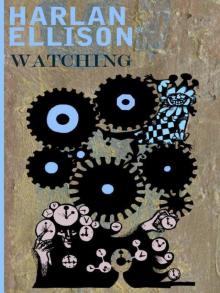 Harlan Ellison's Watching
Harlan Ellison's Watching Over the Edge/An Edge in My Voice
Over the Edge/An Edge in My Voice Troublemakers: Stories by Harlan Ellison
Troublemakers: Stories by Harlan Ellison Gentleman Junkie and Other Stories of the Hung-Up Generation
Gentleman Junkie and Other Stories of the Hung-Up Generation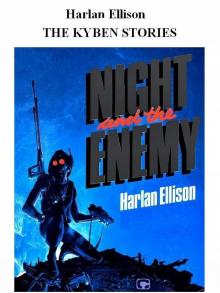 The Kyben Stories
The Kyben Stories From the Land of Fear
From the Land of Fear The Top of the Volcano: The Award-Winning Stories of Harlan Ellison
The Top of the Volcano: The Award-Winning Stories of Harlan Ellison Sleepless Nights in the Procrustean Bed
Sleepless Nights in the Procrustean Bed Ellison Wonderland
Ellison Wonderland Children of the Streets
Children of the Streets Can & Can'tankerous
Can & Can'tankerous Love Ain't Nothing but Sex Misspelled
Love Ain't Nothing but Sex Misspelled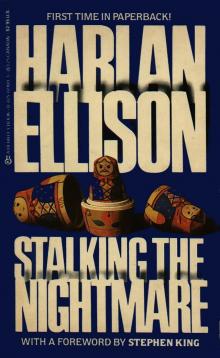 Stalking the Nightmare
Stalking the Nightmare Approaching Oblivion
Approaching Oblivion Deathbird Stories
Deathbird Stories Partners in Wonder
Partners in Wonder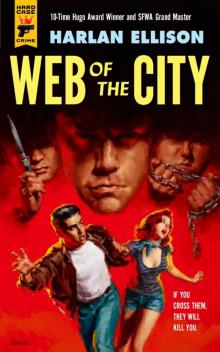 Web of the City
Web of the City Spider Kiss
Spider Kiss A Boy and His Dog
A Boy and His Dog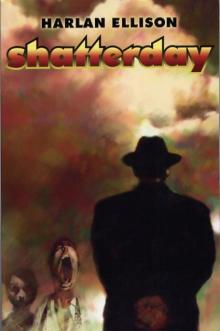 Shatterday
Shatterday Slippage: Previously Uncollected, Precariously Poised Stories
Slippage: Previously Uncollected, Precariously Poised Stories Repent, Harlequin! Said the Ticktockman
Repent, Harlequin! Said the Ticktockman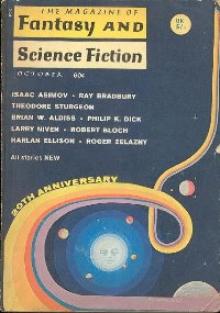 Come to Me Not in Winter's White
Come to Me Not in Winter's White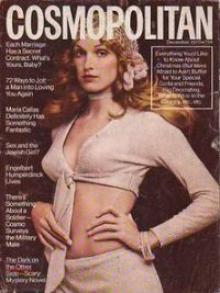 The Song the Zombie Sang
The Song the Zombie Sang The Other Glass Teat
The Other Glass Teat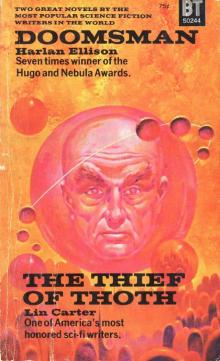 Doomsman - the Theif of Thoth
Doomsman - the Theif of Thoth The City on the Edge of Forever
The City on the Edge of Forever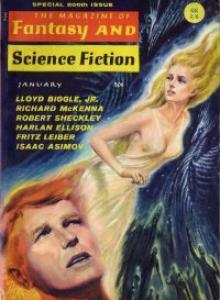 I See a Man Sitting on a Chair, and the Chair Is Biting His Leg
I See a Man Sitting on a Chair, and the Chair Is Biting His Leg The Harlan Ellison Hornbook
The Harlan Ellison Hornbook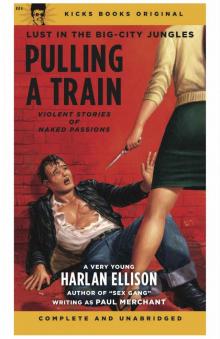 Pulling A Train
Pulling A Train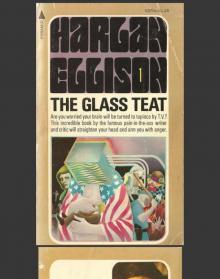 The Glass Teat - essays of opinion on the subject of television
The Glass Teat - essays of opinion on the subject of television An Edge in My Voice
An Edge in My Voice Angry Candy
Angry Candy Troublemakers
Troublemakers The Top of the Volcano
The Top of the Volcano Over the Edge
Over the Edge Survivor #1
Survivor #1 Slippage
Slippage